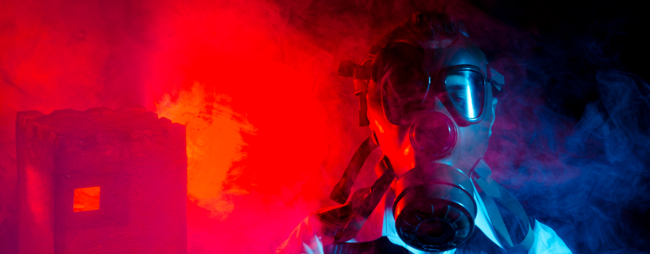By Adele Gardner
On high-ozone days, we all wear masks,
Filtering what air there is to breathe,
Supplementing it from oxygen tanks.
Still, it pays to walk
Slowly.
Owls do not have masks.
We keep them in a room
With potted trees and recycled air
And VR walls simulating night
That emit a jaguar’s warning growl when they fly too close.
Broken wings are hard to heal,
Almost as hard as
Broken hearts.
Cats refuse to wear masks.
We screened our porches for them with tri-X glass,
Blocking the worst of the UV-glare,
So they could gargle at birds and eat their hearts out.
But you can’t watch cats all the time:
They keep slipping from the corner of your eye
And out through cool, moist tunnels,
Popping up to snag the rare bird
Huddled fluffed on the ground,
Gasping for breath.
Fish wanted masks,
Thinking to filter food from hooks,
But the straps kept slipping off,
Sliding over slick-scaled sides,
Fins cutting through the line that supplied the gills with oxygenated water.
Still, they’re smarter than most:
While warming oceans and chemicals choke the oceanic flora,
They’re taking a cue from the whales
And growing fuzzy baleen suits
To filter out oil and mercury
Before it can touch absorbent skin
And become their nature.
Code Blue
We didn’t know it would get this cold.
The sun looked bright enough.
But solar physicists warned of the sun’s dead face:
no sunspots, solar silence spelling slight chance
of future warmth, speaking the same sharp warning
as ice cores in Greenland: sudden
Fahrenheit spikes, drastic degree hikes
before the ice age resumed, the ice breaking at last
almost twelve thousand years before our lack of ice last January—
except in popular ice-rink attractions,
to which we drove from miles around
while the generators that kept things cold
spewed more warmth into the air.
When our new mini-ice age settled in,
we didn’t recognize it: our quiet, sleek companion
wrapping us with a welcome chill like ice cubes in July.
We gazed up at the stars, bright and clear as a December night,
the trees stiff with frost, catching the orange moon in their arms
like that burnished silver dollar we had as kids,
traded for a handful of disappointing dimes
so small they were flakes on the finger.
We needed the money that winter to eat,
but our hearts were cold. We didn’t know we had to protect
that little magic, our metal box of foreign coins,
parental history, rattling souvenirs of
their foreign travels before we were born,
till we came home from school one day
to find that Dad had traded them in
for roast beef and potatoes,
and we mourned our lost splendor
while we finally filled our bellies.
Who knows what will come to us in the dark,
now that our parent’s eye has turned cold,
and the sun cuts us loose to make our own light and heat?
Maybe thermonuclear fire will be enough,
combined with nuclear families—
all people are siblings under the skin,
now that we huddle together for simple warmth—
giving “heat” a new meaning,
making love a truly sacred act, just so long as
it doesn’t produce any more mouths to feed.
We told ourselves fables, once—
believed the earth would get hot, but we’d handle it,
cocooned in our blanket of smog like self-delusions.
That insidious mistake shields us now from heat, from light,
while the sun grows cold and the ice storms shower us
with our own history, bathing the polluted planet in blue,
iced anew in swirling layers of frost.
About Adele Gardner


Leave A Comment